UO School of Journalism and Communication (SOJC) alumni Zach Bruhl ’20, Ronald Clark ’14, Billy Spotz ’22 and Briana Chavez ’21 all landed jobs at Eugene’s KVAL and KMTR news stations by networking with each other: Bruhl initially heard that KVAL was hiring because of Clark’s social media post and acquired the position because of Spotz and another SOJC graduate Takur Conlu ’21. Then Bruhl helped Chavez get her job.
All of them attribute their success working in the Eugene broadcast news market to the education and training they received at the SOJC, whether it was the advice, support and skills from faculty or the boots-on-the-ground experience they got reporting for Duck TV.
The SOJC pipeline is valuable to news stations as well “because it gives the stations consistent access to a pool of up-and-coming workers,” said Brandon Kamerman, KVAL assistant news director. “Plus, it keeps us connected with emerging journalists who are already familiar with the area.”
All four SOJC alumni took different paths to land positions at KVAL and KMTR, and all of them are thrilled to be working in Eugene. Here are their stories:
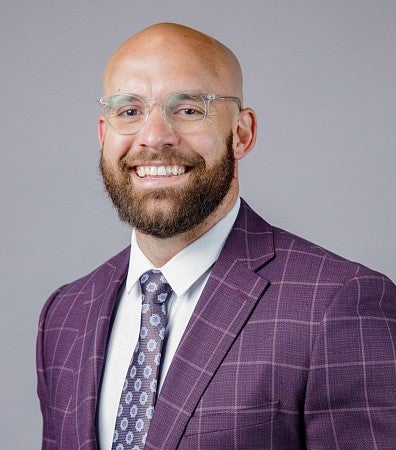
Zach Bruhl ’20:
The life of a morning news anchor
Bruhl, a morning news anchor and SOJC journalism alum, starts his weekdays at 3 a.m. After anchoring from 5 to 7 a.m., he eats an early lunch of chicken and rice at 8 a.m. before continuing with content strategy meetings and community outreach segments alongside his fellow anchors.
Coming to the SOJC after attending Lane Community College and the University of Hawaii, Bruhl took a nontraditional route. But the path was the right one at the right time, he said.
“Professionally, those were the most formative years in my life,” Bruhl said. “I was so nervous to come back to school, but the people in this building welcomed me with such open arms and such grace. Without that, I don’t know if I would’ve stuck it out. I was not a very good student before this school, and I think the culture here helped nurture that.”
Bruhl formed especially strong bonds with crewmates at Duck TV, an SOJC class and student-run studio that operates just like a professional broadcast station. When it came time to say goodbye, it was hard.
“I was a mess at my last Duck TV meeting,” he said. “I was crying throughout the entire thing.”
The camaraderie formed at Duck TV continues to this day. Bruhl’s former colleagues text every day in a group chat, keeping tabs on each other’s careers and cheering each other on. That’s why he advises current students to find the extracurricular activities or passions that match with their career goals to meet like-minded people and make legitimate connections that might last a lifetime.
Duck TV teaches relevant skills
Bruhl attributes his proficiency in managing tight deadlines to his fieldwork with Duck TV.
“Duck TV was just like the real world, where it’s go, go, go. You had to get this thing done and had to get it up to beat the professionals,” he said. “That is the pressure cooker you exist in outside of this building, so that really helped.”
He credits the SOJC reporting courses with Peter Laufer and Lisa Heyamoto for teaching him the interview strategies he uses every day, especially how to make the interview subject comfortable and how to be a better listener.
“The SOJC helped me learn literally everything I know in this industry,” Bruhl said. “Without the skills I learned here, I would not be doing this. My bosses tell me that I’ve exceeded their expectations at every place I’ve worked so far, and I give that credit to the experiences at the SOJC.”
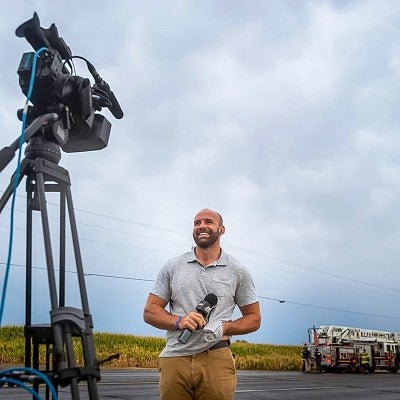
He also mentioned the notable difference between SOJC students and the non-SOJC students he has worked with.
“You can see the work difference. You can see work ethic. You can see the skill set that comes through the door,” Bruhl said. “Some people I work with I can see consistent lapses in the cutting-edge area of journalism that you don’t often see in coworkers that come out of the SOJC. The SOJC is constantly developing and growing. They are constantly growing to help develop better and better journalists every year.”
After graduation and before working at KVAL and KMTR, Bruhl landed a reporting job at KMVT in Twin Falls, Idaho. Moving to a brand-new city, knowing nothing about the place, knowing nobody there and having to find two stories each and every day, was brutal.
The intensely competitive job expectations for low pay were so grueling that Bruhl said he was losing sleep and feeling depressed. But he stuck with it and is glad he did.
“Be willing to grind in the beginning,” he advises. “In three years, I’ve gone from making absolutely embarrassing money to making money that pays my bills and allows me to start saving. It didn’t take all too long to get there. It does pay off if you work your tail off. But you absolutely have to work your tail off.”
After his contract with KMVT ended, Bruhl stumbled across SOJC alum Clark’s social media post about open positions at KVAL and KMTR. He loved Eugene and was eager to get back, so he applied, and got the job with the help of Conlu and Spotz. Later, he helped Chavez secure her job at KVAL and KMTR.
“I love my job. I don’t know that I’ll leave this job, frankly. I see myself being here for the long haul,” Bruhl said. “I have very humble aspirations. I’m trying to be that person who makes time for community outreach. The dream is just being a well-known local news provider.”
He lives down the street from campus and walks through Allen Hall with headphones on now and again to reminisce about the most transformative years of his life and read the articles on his favorite professors’ office doors.
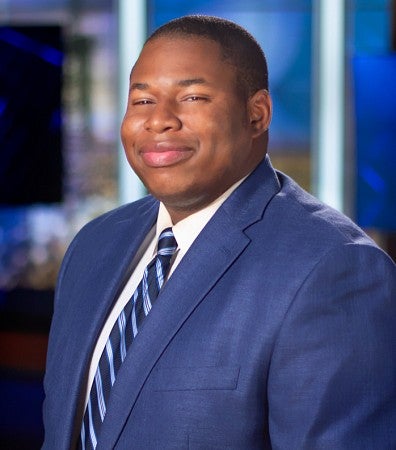
Ronald Clark ’14:
How a sports enthusiast became a sports anchor
While looking up his favorite ESPN broadcasters as a high schooler, Clark discovered that most of them studied journalism. He searched for top journalism programs, and the SOJC was on the list. As an avid UCLA fan and Pac-12 viewer, he was familiar with the UO, and it became his top choice for colleges.
After graduating, Clark covered prep sports at the Bend Bulletin newspaper. He then returned to Eugene, where he got a job at KEZI and eventually was promoted to sports producer.
He briefly left Eugene for a sports anchor job at KCBD covering Texas Tech for two years, but returned to Eugene to work for KVAL. “I felt as if there was unfinished business here because I wasn’t the on-camera person,” Clark said.
“I wasn’t given that opportunity to be the full on-air person. Now I have the opportunity to be that person on camera and in my college town, covering my alma mater. It’s fun to do.”
Clark is entering his third year as a sports anchor in Eugene, currently working the 5:30 p.m. slot on KMTR, the 10 p.m. on FOX34, and the 11 p.m. shows on KVAL and KMTR.
If he hadn’t gone to UO, Clark says he doesn’t think he would be at KVAL or even in the Eugene local news market today.
“The SOJC really gave me a leg up,” Clark said. “It gave me a jump start that some other students didn’t get. There are a lot of people who come into the newsroom with varying experiences. The SOJC put us on the right track by giving us that experience and having equipment you can work with early on before you get into a real newsroom.”
Through Duck TV, instructors like Rebecca Force and other experiences in the SOJC, Clark felt prepared to go into the field.
At Duck TV, students were “bumping shoulders with the people who were in the positions we’re in now, getting advice from them and seeing how they work.”
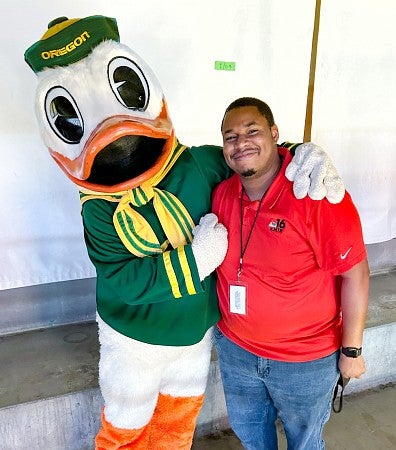
Clark credits the SOJC for not only allowing him to practice the job before applying for one, but also for connecting him with a network of aspiring journalists he continues to seek advice from. With nearly 10 years of professional work, he says many of his field experiences were unique to the SOJC.
Duck TV allows students to work at a real studio, anchor shows and report on games.
“Being around all that gear and in the studios starts your job before you start it,” Clark said. “That helped out because once we got into the professional field, we were used to doing the job and being around all these different things and knowing how shows work.”
The SOJC also exposes students to “the grind,” he said. Clark’s final college project was to shoot and edit a segment to air in the course’s final live broadcast show. His group chose to record a package on student entrepreneurs. After being in the Allen Hall computer lab for hours, Clark was still there at 5 a.m. the morning of the show, finalizing the segment before heading home.
“I was working upstairs in the lab, and there was a classmate of mine working downstairs,” he recalled. “Around 2 a.m. he decided he was going to stop where he was and come back the next morning. I decided to stick it out,” he said. “I got back to my apartment probably at 6 a.m. and the class was at 8. I was like, ‘Do I just go to sleep or do I stay awake because I don't want to miss it?’ I was so glad I decided to stay because I was able to finish my segment and get it uploaded to be able to run in the show.”
His classmate, who returned early in the morning, didn’t have his segment ready to air.
“Thank God I decided to stay,” he said. “That being my last project, that was the way to do it.”
While his long-term goal is to broadcast for ESPN, for now Clark is embracing his love for the grind of local news, shooting his own footage, editing and being on the sidelines at games.
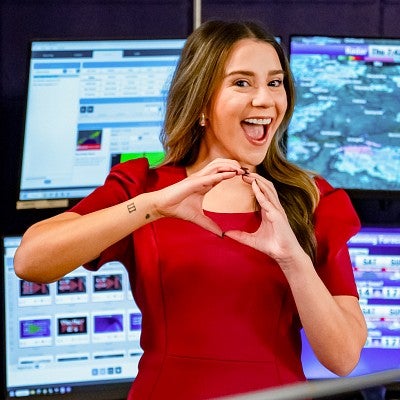
Briana Chavez ’21:
Falling into weather forecasting
During her time at UO, advertising and journalism alum Chavez started a podcast called “TLA Sports,” or “The Life After Sports,” with Bruhl and another friend. It focused on what famous athletes were doing after leaving their sports.
Chavez and Bruhl continued to keep in touch after graduation. When her news reporting contract ended in Tri-Cities, Washington, she reached out to Bruhl, who said KVAL had an opening for a weather forecaster. She got the job.
She loves that weather forecasting lets her show her personality on air, and viewers love it too.
“Truly, these people let us into their homes,” she said. “And it just shows, especially when we're out and about at the grocery store, and they say, ‘Oh, my gosh. You're doing such a great job. We love seeing you. You're so fun on TV.’ And it’s just a relief that they see my authentic self.”
Another Duck TV alum, Chavez also credits the student-run television network for preparing her for the job and helping her feel comfortable on camera.
“I'd never touched a camera before in my life, and Duck TV helped me with that,” she said. “The fact that we were all on the same page on Duck TV and we were all trying to learn from each other was beneficial. Then I went to my first market and they were like, ‘How do you know all of this?’”
As she continues her weather forecasting career in the Eugene market, Chavez appreciates having other SOJC Ducks around the news station. “We all bond over the same experiences,” she said. “It was always a tradition to go film, go to McDonald’s, go edit, nearly fall asleep editing until like 2:30 in the morning, and then go home and be like dead the next day.”
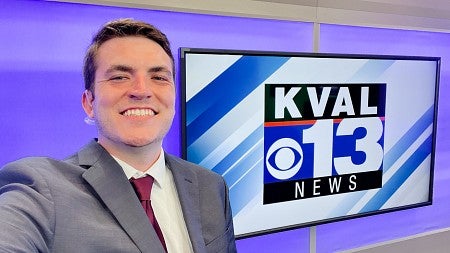
Billy Spotz ’22:
The broadcast journalism career
Previously a reporter for KVAL, Spotz recently became a KVAL producer working on the 5 p.m. and 6 p.m. newscasts. Starting at KVAL about a month after he graduated, Spotz originally got the job because of a broadcast journalism workshop that SOJC professor and former TV reporter Jesse Abdenour put on with the news director of KVAL.
He referred to Abdenour, who taught him to put together broadcast packages, as his “guiding light.” Working with Abdenour made him want to become a broadcast journalist.
Abdenour wasn’t the only professor who prepared him. In a video production course with Senior Instructor Sung Park, Spotz learned how to work with cameras, edit, sound mix, color grade and other technical editing skills.
“Park is great at what he does and has a great mind for video,” Spotz said. “He really did a tremendous job of going through video footage with me. He gave me notes frame by frame, telling me, ‘Hey, you're slightly overexposed here.’ He helped with a lot of the technical stuff around video editing and producing.”
While Park and Abdenour shaped Spotz’s broadcast journalism career, Spotz still recognizes that “there’s not a single professor I had in the SOJC that I don't have a positive memory associated with. They always cared about their students’ future. And they wanted to make sure that their students were set up for success.”
He advises current students to talk to professors. “Take advantage of those office hours. Find a professor that you can look to as a mentor, and they will help you out,” he said. “It happened with me and Jesse Abdenour. Even if they can't help you out, they will find somebody who can because the journalism world is very interconnected.”
The KVAL and KMTR news stations and the pipeline of SOJC alumni are testaments to the interconnectedness of the journalism world.
“It was very comforting seeing people I graduated with come to work here too,” Spotz said. “Students becoming the face of Eugene media is cool because it shows both the efficacy of the program but also how special Eugene is because of people wanting to stay and wanting to come back.”
—By Sydney Seymour, class of ’25
Sydney Seymour '25 (she/her/hers) is a media studies major minoring in ethics. She is a writing intern for the SOJC and the executive writing editor for Align magazine. Connect with her on LinkedIn.
